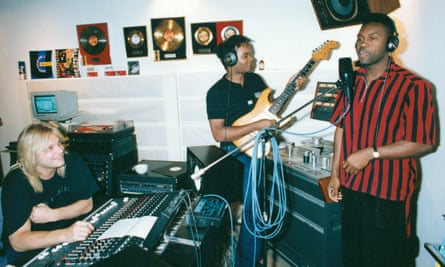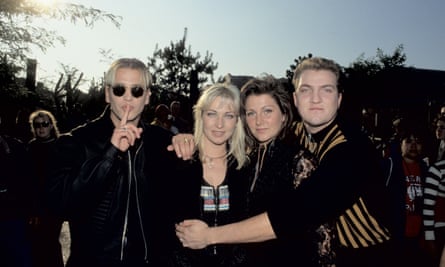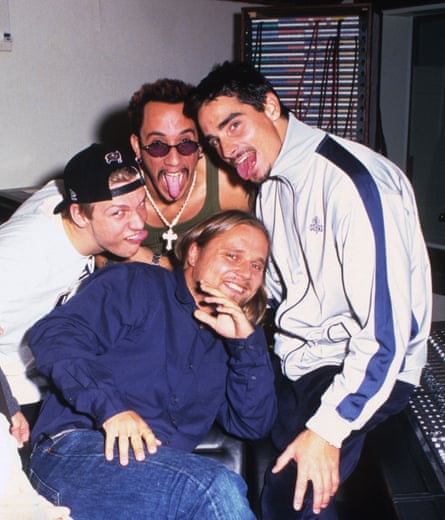In producer Denniz Pop’s old studio in Stockholm, above the mugs of coffee and overflowing ashtrays, sat a cherry red light that he would trigger when he knew he had made a hit. In the mid to late 90s, thanks to songs for the likes of Backstreet Boys, Robyn, 5ive, ‘NSync and Ace of Base, that light was rarely off. A well-known DJ on the Swedish music scene, the perpetual joker born Dag Krister Volle helped turn Sweden into a global pop powerhouse, recruiting a gaggle of young songwriters and producers, including a certain Max Martin, that would continue to define pop’s sound – think playful, funk-heavy R&B fused with very Swedish major-chord choruses – even after his sudden death in 1998 aged just 35.
Recruited by Pop in 1993, Martin has since created 25 US No 1 singles, second only to Lennon and McCartney. “When he first invited me to work with him, I don’t know what he saw in me,” the interview-shy Martin tells me. “I didn’t know my way around a studio, but I guess he saw something.” His legacy lives on not just through his mentee, but also via Sweden’s annual Denniz Pop awards, which celebrate their 10th year this June. Under the stewardship of producer and songwriter Jacob Schulze, and an 11-person jury that also includes Martin and pop star Tove Lo, the awards aim to support the next generation of Swedish talent. Past winners have included newcomers Winona Oak and Oscar Stembridge, while everyone from Avicii to Mabel to Snoh Aalegra have scooped the night’s biggest award, the Grand Prize, which celebrates Swedish success on an international stage.
Schulze compares what Pop did with Cheiron studios to a hit factory like Motown. “He started a new business of Swedish youngsters writing songs for US and English artists,” he says. “That was unheard of back then.” By 2013, the awards’ inaugural year, Schulze felt like Pop – who would have turned 60 this week – was starting to be forgotten. “The whole collaborative way of working [in studios now], he started. We thought it was time to pay tribute to him and all the morals and values that he stood for. It wasn’t about making money, it was about making hits. And he loved making hits.”
Singer-songwriter and jury member Lisa Miskovsky agrees: “His idea about working together and sharing ideas and being creative struck me first time I entered the famous Cheiron studios. You could feel the energy and how everybody working there had the same drive.”
Pop was born in Tullinge, greater Stockholm, in 1963. Despite having Sweden’s music-focused educational system at his disposal, he refused to play an instrument, quitting recorder lessons after just three attempts. “It was really boring,” he is quoted as saying in John Seabrook’s book The Song Machine. “Really my only interest was to purchase records, and sit at home playing them.” A fan of funk and soul, he would often DJ at Ritz, Stockholm’s premiere gay club, and when he was 23 he co-founded SweMix, a remix service featuring a collective of 10 DJs. While the remix jobs were lucrative, he quickly felt the need to start making his own songs. In 1992, he quit and set up Cheiron, named after the centaur in Greek mythology who teaches Dionysus to sing and dance, and steadily brought in mutual acquaintances from Stockholm’s tightknit community of songwriters and producers.
In 1988, he released Gimme Some Mo’ (Bass on Me), his first single under his new name, Denniz Pop. He was a fan of nicknames, later changing metalhead Martin Sandberg into Max Martin; his new surname was both a dig at his muso friends’ rarified music tastes (he hated the complexity of jazz), and an acronym for Prince of Pick-ups in honour of his DJing prowess. Denniz, meanwhile, was inspired by professional rebel Dennis the Menace. “He always brought fun to the studio,” remembers Martin. “We’d play video games – it was 80% fun, 20% work.”
Pop even built his own computer games, creating a shoot-’em-up inside a replica of the Cheiron studios. On other occasions, he instigated a city-wide treasure hunt for his studio mates, or suddenly declared that all the electricity in the studio would be turned off in three minutes because he was taking everyone bowling. Later, when ‘NSync – who had worked with Pop on debut single I Want You Back – started challenging the Backstreet Boys for boyband supremacy, Pop would deck the Cheiron team out in ‘NSync hoodies while recording the latter’s vocals. “That [sense of fun] is what we always tried to bring to the music,” adds Martin.

One of Pop’s first big successes as a producer came in the shape of DJing dentist Dr Alban, AKA Alban Nwapa, who followed up Swedish hit Hello Afrika with international smash (and Tampax ad soundtrack song) It’s My Life in 1992. “I was DJing in the same club as him,” Nwapa says. “I was talking in between records, playing around, rapping, and he said, ‘This sounds good, can we do something with it?’” With no formal music training, Pop liked to keep things simple in the studio. “Most of the time you want to do more, more, more, but then you end up spoiling the whole thing,” says Nwapa. “You end up taking the hit out of the song.” Schulze agrees: “He’d be like, ‘Why do you have that part in the song? What’s the point? No one’s going to listen to that anyways. Keep it short’. He was a true genius in his own way.”
Dr Alban was followed by Ace of Base, whose songwriters Jonas Berggren and Ulf Ekberg had sent an early demo tape to Pop. One song, which Pop originally hated but slowly came around to after getting the tape stuck in his car’s cassette player, was Mr Ace, later re-produced by Pop as All That She Wants. It topped the charts in 13 countries, and peaked at No 2 in the US. Its US follow-up, The Sign, another Pop co-production, did one better, with the accompanying album selling more than 23m copies globally. “The Dr Alban stuff was kind of cool,” says Schulze, “but the Ace of Base stuff wasn’t that cool. But he didn’t care what people said as long as people danced to his music. That was his goal. He wanted a lot of people to like his music, not journalists.”

Ace of Base’s US success opened the floodgates. Suddenly everyone – from Michael Jackson’s nephews 3T to emerging US boyband the Backstreet Boys to British rabble 5ive – were interested in flying to Stockholm to work with Pop and his ragtag of misfits. “Denniz was the kind of producer that was always focused on the track and movement of the song,” says Backstreet Boys’ Brian Littrell. “He wasn’t the guy always at the front of the board, but I always remember him feeling how the music made him move in the studio.”
after newsletter promotion
While 5ive’s Scott Robinson was in awe of Pop’s work with their US boyband counterparts – “I remember talking to Denniz and he was playing me some of the new songs the Backstreet Boys had coming up,” he told me for my book on 90s pop, Reach for the Stars – Schulze remembers 5ive’s time in the Cheiron studios with somewhat mixed emotions, with Simon Cowell’s new charges very nearly breaking Pop’s cool and calm demeanour. “I actually recorded the whole 5ive album by myself because they were really obnoxious, so [Denniz] left the studio,” he laughs. “They were really all over the place, screaming and running around. People couldn’t stand them. The studio was basically empty for a week while they recorded with us.”

In December 1997, the same month 5ive released their Pop-assisted debut single Slam Dunk (Da Funk), Pop was diagnosed with throat cancer. “He had problems swallowing when he was eating,” says Schulze. “We were joking about it because we didn’t know. So we’d be like ‘it’s probably cancer’, with our dark Swedish humour.” After the cancer spread, his girlfriend, with whom he had a son, shaved off his trademark blonde hair ahead of his treatment. Back in the studio, Martin, who was suffering from panic attacks brought on by the stress of worrying about his friend and mentor, was hard at work recording songs for a new US singer, Britney Spears. “He wanted us to carry on but it was really hard,” says Schulze.
On 30 August 1998, Denniz Pop died aged 35.
“We did a lot of self-therapy,” says Schulze of the period thereafter. “Nobody really worked in the studio for three or four months. The really big stuff happened just after he passed away – the Grammy nominations and ridiculous record sales. That was everything he had built up, so it was really sad.”
Via the Denniz Pop awards, Schulze and co now get to keep the connection between Pop nurturing new Swedish talent and the country in the forefront of people’s minds. “It’s what the awards are all about,” says Martin. “Taking a chance and supporting young songwriters and artists who need that chance in line with his philosophy.”

